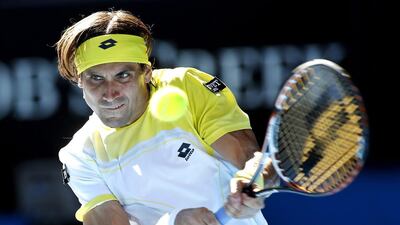ABU DHABI // Six of the world's top nine players, including the current top four, will fight it out for a winner-takes-all US$250,000 (Dh918,275) prize at the Mubadala World Tennis Championship in Abu Dhabi later this year.
Organisers had already inked in Rafael Nadal, defending champion Novak Djokovic and 2009 winner Andy Murray.
Yesterday, at the Abu Dhabi International Tennis Complex at Zayed Sports City, organisers announced the remaining three participants: David Ferrer, Stanislas Wawrinka and Jo-Wilfried Tsonga.
Put together, organisers said, this will be "the strongest line-up in the history of" the championship, now in its sixth year.
The tournament, which has doubled up in recent years as ideal preparation running into the new year's first major the Australian Open, will take place from December 26-28.
The organisers also announced Pat Cash as an ambassador, with the former Wimbledon champion hosting a tennis clinic for 400 schoolchildren in the afternoon.
"It's a very competitive field and it really doesn't get any tougher than that," Cash said. "It's the equivalent of playing a grand slam quarter-final - and a good grand slam quarter-final."
Ferrer, the world No 4, echoed those sentiments.
"With such a strong line-up you know it's not going to be an easy three days, but that's what makes it exciting," he said. "Everyone is working hard to be at the top of their game for the season ahead, and for us, this is a way to put our training to the test against the top players in the world."
Nadal, Murray and Djokovic are previous champions and the Spaniard, freshly crowned world No 1 this week, returns after pulling out late last year due to an injury.
The three names added yesterday have all played here before and have had strong seasons.
Ferrer broke through to his first grand slam final at the French Open. Wawrinka, meanwhile, was a hugely popular semi-finalist at the US Open last month, but also played in arguably two of the finest grand slam matches this year, both against Djokovic.
He lost a five-hour, fourth-round epic in Australia having been 6-1 5-2 up and then again at the US Open semi-final, after leading two sets to one in a match that turned on a 21-minute, 30-point game in the final set.
"There are two players who have had breakthrough years, [and with Tsonga] two of the most exciting all-round players on the circuit this year," Cash said. "We have the world's top two players, who probably form the greatest rivalry in tennis history.
"They've played each other 38 times, more than Nadal-[Roger]Federer. This leads into the Australian Open so the players come here, they are ready to go. It's not a casual warm-up event, they are 100 per cent ready to go when they come here."
The seeding for the tournament has not yet been finalised though, if it follows previous years, the top two in the world rankings, currently Nadal and Djokovic, will get a bye to the semi-finals. The other four players will face off on the first day, before semi-finals and the final on the other two days.
osamiuddin@thenational.ae

Ferrer, Wawrinka and Tsonga added to Mubadala World Tennis Championship
The tournament announced on Tuesday that the trio would join Rafael Nadal, Novak Djokovic and Andy Murray, who were already confirmed as participants.
Most popular today
